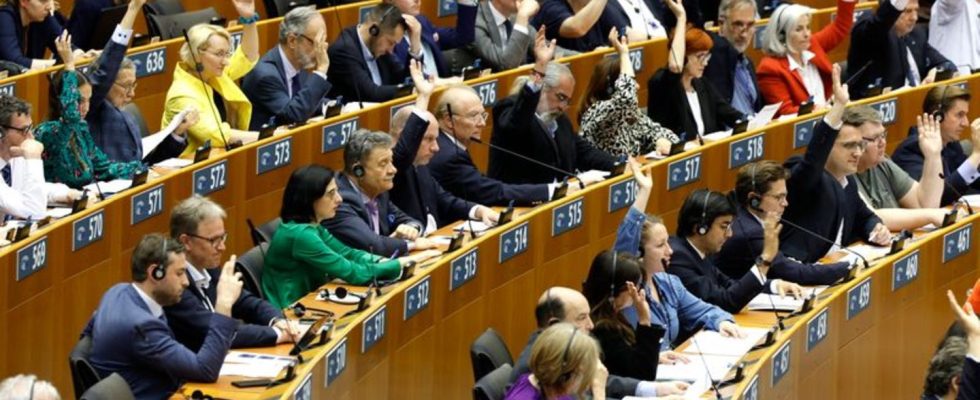For years, asylum reform was the bone of contention in the EU. Now the vote in the European Parliament was once again a nail-biter.
Easier deportations and more border protection: After years of discussions, members of the European Parliament in Brussels voted to tighten EU asylum law.
Federal Interior Minister Nancy Faeser (SPD) then announced that she would work to ensure that the reform that had now been decided had an effect as quickly as possible. “After years of tough negotiations, we have agreed on this comprehensive package. In doing so, we have overcome a deep division in Europe,” said Faeser in Berlin. Germany, together with the EU Commission and the Belgian Council Presidency, will now “work very intensively to implement the Common European Asylum System as quickly as possible”.
The reform aims to oblige member states to adopt uniform procedures at the external borders so that it can be quickly determined whether asylum applications are unfounded and refugees can then be deported more quickly and directly from the external border.
However, many MPs were dissatisfied with the compromise negotiated in December. It was therefore unclear until the end whether the plenary session would agree. Protest was also visible during the ongoing vote, as activists from the visitors’ gallery shouted “This pact kills – vote against it” and threw paper airplanes into the plenary session. The unexpected action caused mixed reactions among MPs: some stood and applauded, while others criticized the protest.
There has been debate about the EU’s migration policy for years
Intensive work has been underway on a reform since 2015 and 2016. At that time, countries in southern Europe like Greece were overwhelmed by large numbers of people from countries like Syria. Hundreds of thousands came to other EU countries unregistered. This actually shouldn’t have happened because, according to the so-called Dublin Regulation, asylum seekers should be registered where they first entered the European Union.
In particular, the reform means much tougher treatment of people from countries that are considered relatively safe. A third country can only be classified as safe if a strict list of criteria is met. For example, the life and freedom of the applicant must be guaranteed.
EU Commission President Ursula von der Leyen welcomed Parliament’s approval. “The pact strikes the right balance between stricter rules against abuse of the system and care for the most vulnerable,” she said afterwards in Brussels. This means that people who do not have the right to asylum are not allowed to enter the European Union, while those fleeing war or persecution can count on the necessary protection.
If countries do not accept refugees, they must provide support
In the future, people arriving from countries that are considered safe will be able to come to strictly controlled reception facilities under prison-like conditions after crossing the border. Normally, it would then be checked there within twelve weeks whether the applicant has a chance of being granted asylum. If not, it should be sent back immediately. In the future, people who come from a country with a recognition rate of less than 20 percent, as well as people who are considered a threat to public safety, would have to go through such a border procedure.
According to the plans, the distribution of those seeking protection among the EU states will also be reorganized using a “solidarity mechanism”: If the countries do not want to accept refugees, they must provide support, for example in the form of monetary payments.
Implementation may still take some time
The reform still needs to be confirmed by the EU states. This is usually a formality. The EU states then have two years to implement the requirements. This should give the states at the external borders enough time to create appropriate facilities to accommodate people from states with a recognition rate of less than 20 percent.
In the short term, nothing will change in the situation in Germany. Migration researcher Zeynep Yanasmayan from the German Center for Integration and Migration Research warned that changes in refugee movements are primarily based on conflict and persecution situations in countries of origin and transit. “How the receiving states act only has a very limited impact on migration, especially on refugees,” she told the German Press Agency. “The impact of host state policies on migration movements, especially refugee movements, is very limited.”
Concern for human rights
There had previously been massive criticism of the reform, among other things because families with children could also end up in the strictly controlled reception camps. The federal government and the European Parliament tried to prevent this, but failed in the final negotiations due to resistance from countries like Italy.
There was also criticism that rejected asylum seekers could be more easily deported to safe third countries in the future. Because with the agreement, more third countries can now be classified as safe, this also applies to mere sub-areas of states. National assessments can also be the basis for this.
The “Seebrücke” alliance said that the tightening measures threatened the basic rights of people on the run. It is time for Europe to assume its responsibility and offer those seeking protection a safe haven.
Parliament press release

